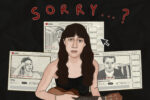Cancel culture has been the subject of endless thought pieces and lukewarm comedy stand-up specials ever since it entered the public lexicon a few years ago. The concept of being cancelled hails from Tumblr in the mid-2000s where it was called “call-out culture.” Call-out posts detailing the offenses people were accused of acted as the law and could ruin the reputations of popular accounts, such as famous horror blog sixpenceee, overnight. When Tumblr fell into decline and its users moved to other social media sites, they brought call-out culture with them. Being cancelled became shorthand for someone being called out, and the social phenomenon of cancel culture was born.
Who is cancelled? James Charles was cancelled several times over his past racist tweets and again for his beauty community feud with Tati Westbrook this past year, which resulted in the loss of 3 million of his YouTube subscribers. Roman Polanski was cancelled in the ‘90s, before cancel culture had a name, for raping a 13-year-old girl and fleeing the country, and was cancelled again during the height of the #MeToo movement. PewDiePie was cancelled for his history of anti-Semitism, Nazi imagery and screaming the N-word during a livestream. Countless other celebrities and even politicians have been cancelled for their trespasses by the general public.
The issue is that being cancelled rarely does anything. James Charles regained all 3 million of the subscribers he lost in a matter of months. Roman Polanski just won best director and best adapted screenplay at the César awards in France. PewDiePie remains one of the most subscribed-to YouTubers. All of these people have been subject to public ire, and, yet, their careers are fine, if not better than they were pre-cancellation.
Despite all of the evidence to suggest that being cancelled typically does no material harm to the person in question, there exists a movement of people who believe it’s gone too far. Common criticism argues that cancel culture restricts freedom of speech and ruins careers based off of allegations. Sarah Silverman even compares it to McCarthyism.
Considering that R. Kelly married a child and didn’t face consequences for his actions for several more decades, the comparison Silverman attempts to make doesn’t hold up. For cancel culture to be modern day McCarthyism, even baseless accusations would result in the end of careers. The exact opposite is true; even when there is clear evidence of a celebrity’s misdeeds, their careers continue.
During the Red Scare, being called a Communist had immediate professional and personal ramifications. John Garfield was a famous and talented actor, but after being listed in the “Hollywood Blacklist” of suspected Communists, his career swiftly ended and he died of a heart attack a year later. Garfield was not a Communist, and being a Communist was never illegal in America, but that did not matter; the mere accusation carried enough weight to ruin his career. Comparing the Red Scare to the constantly growing list of cancelled celebrities that see no impact to their careers is a gross exaggeration at best.
Anti-cancel culture people are typically part of the anti-political correctness movement as well — an ideology that doesn’t value empathy and prefers offending people with hostility framed as the truth. Ben Shapiro has built an entire career off of being anti-PC, as he comes off as being inflammatory to anyone who doesn’t share his beliefs. This group believes that they should be able to say anything, and that the public has become overly sensitive. This viewpoint becomes more insidious when the type of offenses that people are cancelled for are considered.
The #MeToo movement is an extension of cancel culture as it aims to end a culture of silence regarding sexual assault. The goal of the movement is to not only uplift the voices of sexual assault survivors, but to also expose the perpetuators of it. These perpetuators are believed over survivors in most cases. Survivors are told that they are making it up for attention, or that they’re outright lying. When anti-cancel culture and anti-PC individuals decry that allegations ruin lives, these are the lives that they are defending. To be anti-cancel culture is to promote a society that places more importance on the lives of sexual assaulters and others who abuse their power than the people that they’re taking advantage of. And unfortunately, their defense is effective. Many celebrities cancelled through the #MeToo movement continued their careers after their story moved out of the news cycle, like Aziz Ansari and Louis C.K.
However, there are times that cancel culture has successfully ended someone’s career. Azealia Banks was cut from a music festival and dropped by her U.K. booking agency for her racist rant against Zayn Malik and her career has never recovered from the backlash. R. Kelly is awaiting trial for child sex crimes after being cancelled in 2017 in a BuzzFeed News exposé and, again, after the “Surviving R. Kelly” documentary was released. But what does it mean for R. Kelly to be cancelled and in custody when Roman Polanski walks the streets of France freely? Why does Azealia Banks get cancelled for racist tweets, but neither Camilla Cabello or James Charles are cancelled for theirs?
Cancel culture is really just the practice of holding people accountable for their actions. No one is perfect and no one is expected to be, but the line between inherent human imperfection and being a bigot or rapist is not as thin as people make it out to be. Rich white celebrities have enough power that they’re rarely held accountable for anything, no matter the severity of the offense. Black people and people of color are more likely to be held accountable because they are not supposed to be successful in a system that thrives off of racism. They are the first to be cancelled and the last to be forgiven while their white counterparts receive chance after chance to learn from their mistakes. Cancel culture upsets celebrities because they want to exist above the consequences of their actions and the general public is no longer interested in letting them do so.

















